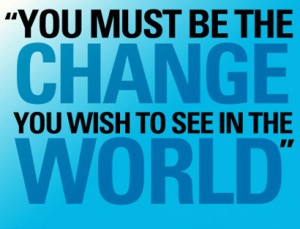 How many of us complain about wanting a friend, spouse, or child to be different–maybe to exercise more, not drink so much, bring in more income, help out more around the house. The list goes on.
How many of us complain about wanting a friend, spouse, or child to be different–maybe to exercise more, not drink so much, bring in more income, help out more around the house. The list goes on.
However, there’s only one corner of your world you can be certain of improving, and that’s your own self.
So often we are wanting and looking at others to change. However, maybe you need to look at how you may need to improve. Have you been telling yourself you need to exercise more, eat better, or reach out to friends more and have the same issues of struggling to make those improvements?
As Gandhi said, “Be the change that you wish to see in the world.”
It is much easier to focus on others rather than ourselves. Why? Because it can be challenging to change negative behaviors.
We like what we know even if the behavior is not what we want. It is what I call comfortably uncomfortable.
For the brain, it is easier to do behavior we know than trying something new. This is why people might stay in an unhealthy relationship or not change jobs they are unhappy at. Often we only improve when it becomes more uncomfortable to stay the same than to change.
Why wait till then?
Our fears also play into our challenge to change. Fear of not getting what we want, that we may not be able to accomplish it, we don’t know what we need instead, or we don’t believe we deserve anything different.
It could also be the fear of hurting or disappointing someone, making them more important than what we need. No wonder none of us jump up and down with joy for wanting to change. It can be quite the feat.
So often I will have a client come in to complain about their partner or child. Sometimes the solution is for my client to change his or her own behavior and this in turn influences the other person to change.
No one likes to be told over and over how they should be different. We can let people know what we want and set boundaries, but role-modeling how to change has a lot of influence on others.
We have these things called “mirror neurons” which makes us want to do what others are doing. That is another article, but for now lets look at how you can make the changes you want in your life.
Here are some simple steps to help you change:
1. Have a goal in mind. Be clear and specific what it is that you want. Check that your goal is realistic, and attainable, and make sure it is your goal and not someone else’s.
2. Start with small doable goals that you know you can be successful at. For example, if you want to start exercising, begin with a five-minute walk that you know you can do, even though your goal may be to run a 5K. The idea is to get started and be successful. Also we have no excuses not to walk living in Newport!
3. Do something each day towards your goal. You are better off doing five minutes of walking per day than 35 minutes one day per week. The reason is that consistency helps in rewiring the brain to create a new habit.
4. Never be critical when you hit a challenge. Know that when you are struggling, it is just a chance to regroup and learn from the challenge.
5. Be your own best friend and cheerleader. Celebrate and enjoy your successes.
“Every worthwhile accomplishment, big or little, has its stages of drudgery and triumph: a beginning, a struggle, and a victory.” – Mahatma Gandhi
Just remember that a year from now, you will wish you had started today. When I went back to school to do my doctorate, I went to sign up with a friend. She changed her mind and decided to wait a year. It is now nearly 20 years later, and she still talks about going back to school. So, start today–you might just be nicely surprised what you accomplish by this time next year.
Dr. Shelly Zavala can be contacted at DrZavala.com or DrZavala@mac.com.




